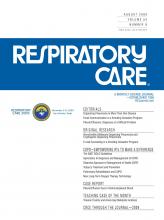Abstract
Although existing evidence confirms that no pharmacologic agent ameliorates the decline in the lung function or changes the prognosis of chronic obstructive pulmonary disease (COPD), inhaled pharmacotherapy is a critical component of the management for patients suffering with COPD. Inhaled agents are directed to provide immediate relief of symptoms and to restore functional capacity in treatment of stable COPD. While COPD may not be cured, knowledge and implementation of currently available guidelines provide the health-care provider alternatives to treat the disease effectively. Respiratory therapists play an important role in the implementation of these guidelines, since they are often responsible for educating patients on the correct use of the inhalers. This paper reviews current evidence regarding the use of inhaled pharmacotherapy in the treatment of COPD and provides a guided approach to the use of different agents in stable COPD.
- anticholinergics
- β adrenergics
- COPD
- chronic obstructive pulmonary disease
- Global Initiative for Chronic Obstructive Lung Disease
- GOLD
- guidelines
- inhalation pharmacotherapy
Footnotes
- Correspondence: Ruben D Restrepo MD RRT FAARC. Department of Respiratory Care, The University of Texas Health Science Center at San Antonio, Texas,MSC6248,SanAntonioTX78229. E-mail: restrepor{at}uthscsa.edu.
Dr Restrepo presented a version of this paper at the symposium COPD: Empowering Respiratory Therapists to Make a Difference, at the 54th International Respiratory Congress of the American Association for Respiratory Care, held December 13-16, 2008, in Anaheim, California. The symposium was made possible by an unrestricted educational grant from Boehringer Ingelheim.
- Copyright © 2009 by Daedalus Enterprises Inc.







